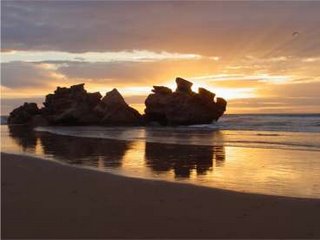SMART MOUTH
What's the Catch? Fresh Fish in a Moroccan Port Town
Sunday, May 7, 2006; Page P05
In seaside hamlets across Morocco, you'll find fishermen hawking the fruits of the sea. But for an experience that appeals to all the senses, Essaouira -- revered by Moroccans and tourists alike for its windswept vistas, laid-back vibe and walled old city -- is the most appealing locale for indulging in fresh fish.
During the 1960s, the Atlantic port city 110 miles west of Marrakesh lured hippies on the North African bohemian trail as a more offbeat alternative to the country's northern port of Tangier. (Though some refute it, Jimi Hendrix is said to have found inspiration for his song "Castles Made of Sand" while chilling in Essaouira.) Today, Essaouira can seem more international than true-blue Moroccan, with French tourists on day trips from Marrakech mixing with dreadlocked Japanese backpackers in town for kite-surfing lessons. Restaurants run by French expats cater to Western palates, but the most authentic place for seafood is the port.
The fish go straight from the sea to the grill in the Moroccan port town of Essaouira.
Just inside the city's imposing ramparts, a few steps from where fishermen haul their nets from colorful wooden boats, a stretch of grill stands -- painted blue and white to match the cityscape -- fringe a small square. Vendors clad in starched whites leap up from picnic table perches to entice diners, but the displays speak for themselves: Piled over ice, there's everything from lobster and fire engine-red crabs to oysters, mussels, octopus, sea urchins, snapper and the attention-grabbing shark or two. Just point to your pick and it'll be sizzling on the charcoal grill before you have time to change your mind.
While it's tempting to set your sights on a crustacean, one of the tastiest and most filling meals is the one that'll set you back the fewest dirhams -- sardines. Most Americans harbor an innate aversion to the small silvery fish. However, fresh sardines are as distant from the canned variety as ahi tuna is from Chicken of the Sea. You can haggle with the stall operators, but the going price is around $10.80 for two people to feast on grilled sardines -- and there's a surprising amount of flaky white meat on those whisker-thin bones.
 The port's standard meal deal includes soft drinks (try Pom's or Hawaii); tomato, cucumber and onion salads; and thick circles of Arabic bread. Be sure to set the price of your meal before it's tossed on the grill -- Moroccans are notoriously efficient businessmen, and many an unwitting tourist has wound up shelling out a sheik's ransom for a single shellfish.
The port's standard meal deal includes soft drinks (try Pom's or Hawaii); tomato, cucumber and onion salads; and thick circles of Arabic bread. Be sure to set the price of your meal before it's tossed on the grill -- Moroccans are notoriously efficient businessmen, and many an unwitting tourist has wound up shelling out a sheik's ransom for a single shellfish.Daring tourists can take the cultural experience down to the fishing boats themselves, a minute's walk away just outside the city gates. Here, djellaba-clad locals swarm over the fishermen's haul of the day, which is piled atop tarps or brims from buckets laid on the ground. It can be intimidating to mingle with the frenzied throngs of Moroccans haggling for their day's lunch, but it's worth the effort.
You'll pay only about a dollar for roughly 20 sardines (easily enough for two or three people), while larger fish such as snapper and eel go for $2 to $3, depending on the weight. Fish doesn't get any fresher, but it's best to pick the specimens with the clearest eyes and reddest gills. Tote your fish back to the same grill stands that hawk their own poisson to have it prepared with olive oil and lemons with all the fixings for about $1.62, including salad, bread and a soda.
The fish stands shut in the late afternoon, giving you a chance to check out some of the restaurants in the medina for dinner. The rooftop terrace at French-owned Taros Cafe (2 Rue de la Sqala) a short walk from the port at Essaouira's main square, is the place for a sunset aperitif; there's even Moroccan wine (from $11 per bottle) on the impressive wine list. Musicians play traditional Gnaoua music most nights, and the menu features Moroccan and French specialties, such as magret de canard (duck breast, $13) and the pastry and pigeon pie called pastilla that's a specialty of Fez (about $8.50).
A few serpentine streets away, near the clock tower, the budget backpacker crowd packs Laayoune Restaurant (4 Bis, Rue Hajjali) for the three-course set menus (about $5-$8) that offer typical couscous and tajine selections, vegetarian harira soup and cinnamon-spiced oranges.

Le Patio (28 Bis, Rue Moulay Rachid) is the hippest spot in town, with cozy candlelit alcoves enshrouded with wispy curtains that conjure South Beach. The wrought-iron embellishments, elaborate lanterns and mosaic tiling, however, are North African all the way. The menu, presented tableside on a blackboard, changes daily to reflect the fresh catch (entrees from about $11). Make like the hordes of vacationing Parisians and cuddle up close on the banquette couches while tucking into such entrees as tajine de poisson (fish simmered with cumin, preserved lemon and vegetables in a traditional conical cooking pot). Sure, the port's
closer to the seaside source, but come nightfall,
there's no restaurant more romantic.
-- Terry Ward
For information on Essaouira, check http://www.essaouiranet.com, which
gives information on everything from apartment rentals to kitesurfing lessons.
For general info on travel to Morocco: Moroccan National Tourist Office, 407-264-0133, http://www.visitmorocco.org.
-- Terry Ward
For information on Essaouira, check http://www.essaouiranet.com, which
gives information on everything from apartment rentals to kitesurfing lessons.
For general info on travel to Morocco: Moroccan National Tourist Office, 407-264-0133, http://www.visitmorocco.org.

1 comment:
Essaouira has almost a thousand nicknames: "the Pearl of the Atlantic", "the sleeping beauty” etc...they can all be traced back to the beautiful Arab word “Souirah”. The word Essaouira means image. Behind its purple ramparts and inside its whitewashed medina with blue doors lies a city that has been influenced by various cultures (Berber, Carthaginian, Portuguese, English, Bambara and others). It was the Jewish traders that once formed the majority of the population and it was they who transformed Essaouira into what became Morocco's most prosperous city in the 17th and 18th centuries.. A cosmopolitan city where houses prices are cheaper than Europe has fuelled a drive in demand for property in Morocco due to such a big amount of tourists and foreigners. Essaouira has been classed as a World Heritage site by UNESCO.
Post a Comment